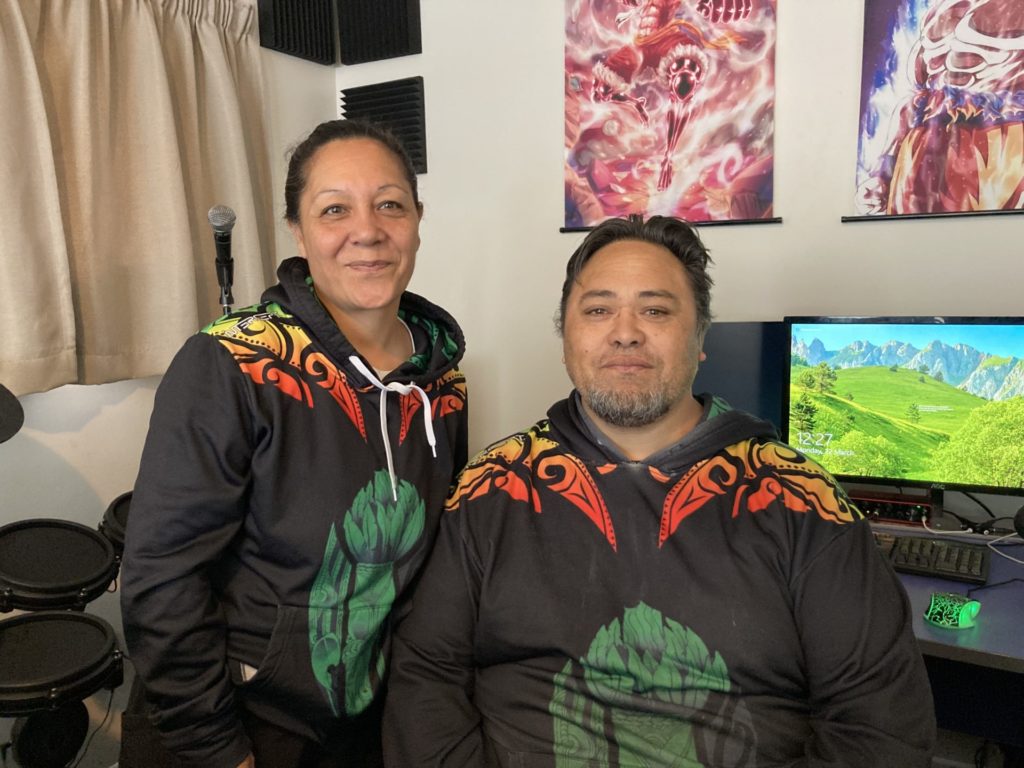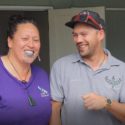Wainuiomata parents Johnny Moewaka Crawford (Ngāti Porou) and Mary Hunia (Ngāti Porou) don’t claim to have all the parenting solutions. But, to cope in today’s complex world, positive parenting is something they try to do, which includes doing things differently.
“Back in the day, because there was lots of alcohol around, I promised myself that that’s not how I would treat my kids. Never lay a hand on them. I wanted something different. I wanted a change – just showing them a lot of love. That’s the important thing.”
Mary Hunia

They have three children: Tama (32), Jahdei (24), and Teremoana (14). Teremoana enjoyed recent success in the 2020 E Tū Whānau rangatahi song competition, and acknowledged her whānau support.
Mary and Johnny’s moemoeā as parents is that their children are happy and able to flourish, despite the difficulties of modern life. This requires deliberate and sustained action on everyone’s part. “It’s important to teach kids respect and humility, love, life morals, and to be an active contributor to their communities,” says Mary.
Realising that positive parenting extends beyond kanohi ki te kanohi and kōrero awhi, they empower their kids by involving them in all whānau-related decisions.
“We include our kids in everything we do as a whānau because we’re one, we’re not individuals. We’re one heart that beats as one.”
Mary Hunia
This requires knowing one another well enough to be sensitive and alert to each other, and evolving and moving forwards together, rather than getting stuck in conflict. Change is nothing to fear, they say, and helping everyone in the whānau to understand this begins with supporting their kids to take responsibility for their choices, for their lives.
Given that, Johnny and Mary are their kids’ biggest fans. They don’t hold back on expressing aroha and giving them plenty of awhi to make the most of their talents and opportunities. They acknowledge that it’s not all easy, but they’re clear that the whole whānau benefits from positive parenting approaches.
“The work we do makes us go within. It teaches us to be better people, to be patient. To love.”
Johnny Crawford
United whānau turn adversity into advantage
Music is a constant in Johnny and Mary’s whānau life. It made sense, then, that when Johnny was unexpectedly let go from his bakery job due to COVID-19, the whānau collectively decided to pull together.
“I love my kids and they love us, and they know what we are trying to accomplish in the future for them. They’re onboard with us.”
Johnny Crawford
They already had musical equipment, which gave the whānau a good foundation on which to build. They established a music studio in their lounge and, dreaming big, the whānau set their sights on online music reviews primarily based in the U.S.A. The whānau hasn’t looked back since.
Johnny says that improved networking and exposure of their talent has been the biggest benefit for his kids. Their music has played on 38 FM and 112 internet radio stations.
Johnny is clear that their collective whānau effort that is delivering long-term benefits is really what positive parenting is all about.
“I just want to try and set my kids up for their future, for the best future possible for them. That’s my ultimate goal.”
Johnny Crawford
Positive parenting – A modern approach with ancient roots
The E Tū Whānau kaupapa draws on traditional Māori values and behaviours, such as positive parenting, among other protective factors. These support whānau to flourish through healthy relationships and strong personal and community identity. Within the kaupapa is the view that tamariki are taonga to be cherished, nurtured and kept safe.
In Our Ancestors, one of the E Tū Whānau resource booklets, Mātauranga Māori and observations by early pākehā settlers in Aotearoa, tell us that Māori whānau experienced harmonious and inclusive lives together. Whānau life was characterised by positive parenting where tamariki were raised to be independent, knowledgeable and actively involved in whānau and hapū.
“I saw no quarrelling while I was there. They are kind to their women and children. I never observed either with a mark of violence upon them, nor did I ever see a child struck.”
Reverend Samuel Marsden, 1814
Want to know more?
Read about E Tū Whānau kaupapa, vision, and Mahere Rautaki (Framework for Change 2019 – 2023) that support whānau to flourish.
Access free E Tū Whānau resources related to positive parenting and flourishing whānau.
Visit SKIP (Strategies with Kids) for positive parenting resources and support.
Read more about pre-colonial Māori family life in an article by historian Anne Salmond.



